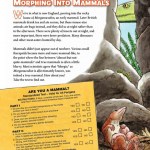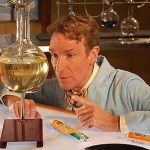education
I'm sure I've done more than enough wibbling about TED for this week, but the only major physics story at the moment involved the Higgs boson, and I'm thoroughly sick of that. So let's talk about Malcolm Gladwell and journosplaining.
Gladwell has a new book out, David and Goliath that from all reports is pretty much exactly what you expect from a Malcolm Gladwell book. I greatly enjoyed the digested read by John Crace in the Guardian. Among the many bad reviews of this were a trio by my colleague at Union, Christopher Chabris-- first a paywalled review in the Wall Street Journal, then a post…
There was a great big New York Times article on women in science this week, which prompted no end of discussion. (I also highly recommend Bee's response at Backreaction.) It's built around the personal story of the author, Eileen Pollack, a physics major at Yale who decided not to go to grad school, and her story is compellingly told, providing a nice frame to her investigation of the question of why there continue to be so few women in the sciences.
Pollack comes out very much in favor of the notion that many women choose not to go to graduate school in the sciences because they don't…
SteelyKid's kindergarten teacher is big on incentives and prizes-- there are a number of reward bags that get sent home with kids who excel in some particular area. I'm not entirely sure what's in these, because SteelyKid hasn't gotten any yet.
This isn't because she misbehaves-- from all reports, she's very good-- but she's in a class with 21 other kids, and they've only been in school for a couple of weeks. Still, she regards this as a grave injustice, and I occasionally get aggrieved reports about the distribution of reward bags when I pick her up from after-school day care. I try to…
We had a faculty meeting yesterday, at which one colleague suggested that in addition to our "Writing Across the Curriculum" requirement, we should have a "Speaking Across the Curriculum" requirement to teach students oral presentation skills. This provoked a bit of tittering about the possible acronym, but it's not an obviously awful idea. The basic problem is the same as with the WAC requirement: there isn't actually all that much that really crosses the curriculum. Presentation standards and styles are dramatically different between disciplines, whether you're talking about oral or written…
This was just too cute (and funny!) not to share. I came across a blog in Scientific American that discussed a "standardized test" created by Hannah Bonner, illustrator and children's writer, to help determine whether someone (or some creature) is a mammal:
Excerpt from "When Dinos Dawned, Mammals Got Munched, and Pterosaurs Took Flight"
The test is part of her book called "When Dinos Dawned, Mammals Got Munched, and Pterosaurs Took Flight." What a great educational tool. It is published by National Geographic Children's Books. Kudos to you Hannah!
Source:
Scientific American
Bill Nye -- scientist, engineer, comedian, author, and inventor -- is a man with a mission: to help foster a scientifically literate society, and to help people everywhere understand and appreciate the science that makes our world work. Making science understandable, entertaining, and accessible is something Bill has been doing much of his life, starting with his days as a math tutor in high school and later studying under Planetary Society co-founder Carl Sagan in college and working as a stand-up comedian. Following in Sagan's footsteps, Bill now serves as Chief…
In a comment to yesterday's post about the liberal arts, Eric Lund makes a good point:
The best argument I have ever heard for doing scholarship in literature and other such fields is that some people find it fun.
I single this out as a good point not because I want to sneer at the literary disciplines, but because with a little re-wording, this could apply to just about anything. The best reason for studying any academic subject is because it's fun.
This is, as I alluded to in a later comment of my own, a significant source of tension for Delbanco's book and a lot of other arguments about…
Sunday evening, as a part of the kick-off to the new academic year, we had a talk by Andrew Delbanco, a professor at Columbia and the author of College: What It Was, Is, and Should Be. This was intended as a sort of affirmation of the importance of the sort of educational experience Union offers, but ultimately, I found it pretty frustrating.
Admittedly, a lot of that was because the talk was at an inconvenient time, 5pm on a Sunday evening being a point when I would normally be home making dinner for the family. Sunday is a school night, to boot, so I needed to get home for dog-walking and…
The JCC day care is closed today for one of the fall cluster of Jewish holidays, which means I'm spending the morning with The Pip before Kate comes home to take the afternoon shift so I can teach my class. Thus, this is more of a tab clearance sort of exercise than a thoughtful examination of the underlying issues. But having spent a bunch of time in the recent past on gender gaps of various sorts, these are some recent links that struck me as interesting enough to pass along.
-- Via Crooked Timber, Anca Gheaus offers cheers for being the "token" woman at academic conferences. This is mostly…
Over at NPR, Adam Frank has an ode to the use of chalk for teaching science, including a bit of warm fuzzy nostalgia:
I have powerful memories of tracking through derivations presented in class when I was a student. When done well, they pinned my attention down. The act of copying what was appearing on the board was a kind of meditation. You had to stay awake and aware, like a man walking across a frozen pond. Let your mind wander for a moment and BAM! You were lost. You couldn't see how the professor had gotten from one step to the next. But keep your focus and you'd be rewarded with that…
This past June, more than 2,000 business, government, and education leaders gathered in Austin, Texas, to discuss the state of science, technology, engineering, and mathematics education in the United States at the U.S. News STEM Solutions National Conference. The USA Science & Engineering Festival was honored to attend and we are looking forward to our partnership for the 2014 National Conference this coming April.
"This is the absolutely perfect time to be talking about STEM education," explained Barbara Bolin, executive director of the Michigan STEM partnership. "…
"Education is an admirable thing, but it is well to remember from time to time that nothing worth knowing can be taught." -Oscar Wilde
As many of you know, last weekend I launched a suggestion box here on the site, and I've been overwhelmed by the response: about fifty of you have sent something in to me in the first less-than-a-week of this alone!
Image credit: Thao Nelson of http://mycredo.wordpress.com/.
So, let's start answering them! There are more than enough excellent questions and suggestions to keep me busy for a long time, but with the new academic year starting up, one of…
While I'm quoting other people saying smart things, Timothy Burke has another great post on the failures of economic models of higher education
There is a lot of information that you could acquire about courses or about colleges that you could reasonably use to assemble a decision matrix. What size is the class or the college? Do you have a good reason for thinking that you flourish in small or large classes or institutions? What do you think you need in terms of knowledge or training? What kinds of environments and teaching styles do you enjoy or find stimulating? And so on–this often…
Poor Arnie.
As much as Ive disliked writing my dissertation, hes disliked it more.
SO BORED.
So as I am trying to write, I either get Cute Bored Arnie:
Or Creepy Bored Arnie:
Ive been sitting at the kitchen table to write. If I look over my right shoulder, those glowing eyes are literally what I see looking back at me. For the past few months. :-/
He has been trying to do the best he can to entertain himself. Ive also been ignoring the laundry, so hes decided to build forts out of my dirty clothes:
But I am FINALLY pretty much done. Just some editing, making sure the page numbers are right…
For older workers, the most dangerous occupational move may be getting behind the wheel.
Last Friday, the Centers for Disease Control and Prevention released data showing that among highway transportation incidents, which are the leading cause of occupational death in the country, the highest fatality rates occur among workers ages 65 years old and older. In fact, workers in that age group experienced a fatality rate three times higher than workers ages 18 to 54. The unfortunate trend was seen across industries and occupations and among most demographic groups, according to data published in…
In one of those Information Supercollider moments, two very different articles crossed in my social media feeds, and suddenly seemed to be related. The first was this New York Post piece by a college essay consultant:
Finally, after 15 or so years of parents managing every variable, there comes the time when a student is expected to do something all by herself: fill out the actual application. Write an essay in her own voice.
By this point, our coddled child has no faith in her own words at all. Her own ideas and feelings, like a language she has not practiced, have fallen away.
Her parents…
"Education is the ability to listen to almost anything without losing your temper or your self-confidence." -Robert Frost
Middle school -- or junior high, which we called it when I went -- should really be classified as a form of child abuse. I recognize that it isn't as bad for everyone as it was for me, but those two years I spent in 7th and 8th grade were easily the worst and most unhappy times of my life.
Image credit: Edgewood Middle School of Hartford County, via http://www.hcps.org/.
Maybe that's hyperbole, or maybe you have a similar feeling when you look back on that time. Moving…
One of my colleagues at Union is doing a physics education research project with a summer student, and is using an online survey to collect data. Obviously, the more people respond to the survey, the more scientific it becomes (subject to the limitations imposed by relying on self-selected Internet samples, of course), so I offered to plug it here. Here's the blurb and link:
I'm doing a summer research project at Union College with a student, and I need as many people as possible to fill out a survey that we created. If you complete the survey by 11:59pm (EST) on Sunday, August 11, 2013, you…
Fair working standards for construction workers and financial profit for developers aren't incompatible, according to a new report from Texas' Workers Defense Project. In fact, consumers are actually willing to pay more to live in places built on principles of safety, economic justice and dignity.
Released this week in collaboration with the University of Texas' Center for Sustainable Development, "Green Jobs for Downtown Austin: Exploring the Consumer Market for Sustainable Buildings" studied consumer attitudes toward sustainable construction jobs and explored the market for certification…
... well, actually, you can start by shutting up.
Then, while you are sitting there quietly read this: Why Teaching Is Harder Than It Looks.
Then, add your advice about how we can fix our system of education to the comments below. But each suggestion must be paid for (with money) and fit into the schedule (by paying someone to do what you suggest instead of what they are at present required to do).
Which means, ultimately, there is one fundamental answer to improving our system of education: Throw money at it. For starters, stop taking money away from it. The, put more in.
Discuss.…







